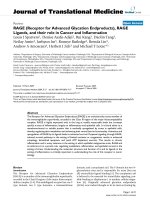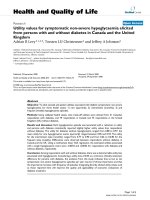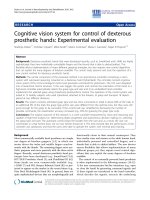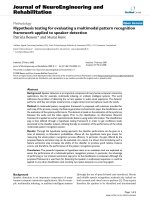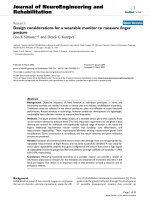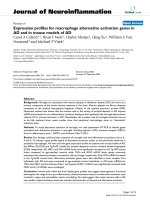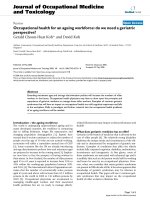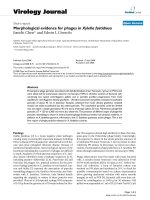Báo cáo hóa học: " Our vision for this new SpringerOpen Access journal, Psychology of Well-Being: Research, Theory and Practice, is to promote a distinctly eclectic approach to investigating well-being. When the prospect of " pdf
Bạn đang xem bản rút gọn của tài liệu. Xem và tải ngay bản đầy đủ của tài liệu tại đây (137.21 KB, 3 trang )
EDI T O R I A L Open Access
Editorial
Dianne Vella-Brodrick
*
and Nikki Rickard
* Correspondence: Dianne.Vella-
School of Psychology and
Psychiatry, Faculty of Medicine,
Nursing and Health Sciences,
Monash University, Melbourne,
Australia
Our vision for this new SpringerOpen Access journal, Psychology of Well-Being:
Research, Theory and Practice, is to promote a distinctly eclectic approach to investi-
gating well-being. When the prospect of becoming Editors in Chief for this journal
arose, we viewed this as the ideal opportunity to promote the integration of knowledge
gained from diverse research fields both within psychology and where psychology
intersects with other disciplines (e.g., biology, economics, philosophy, sociology and
neuroscience). Our co-editorship enables us to advance this idea of integrating dispa-
rate fields with a sha red interest i n well-being, a s we ourselves have backgrounds in
diverse yet complementary areas of psychological research, Nikki from psychobiological
perspectives on emotion, memory and music and D ianne from subjective perspectives
of well-being including meaning, sense of community, positive interventions and work-
place wellness. Our edi torial board members also possess a broad breadth of expertise
which align well with the journal objectives.
It is also important to call on scholars who are able to review and integrate theory
and research from different fields, similar to well-b eing reviews competently underta-
ken by Diener (1984) and Veenhoven (1984) and the more recent meta-analyses con-
ducted by Lyubomirsky and colleague s (Lyubomirsky et al. 20 05; Sin and Lyubomirs ky
2009). Such works enable those in the field to assimilate knowledge already gained and
to develop progressive studies. Henc e, our aim for this new journal is to balance and
integrate retrospection and innovation, and to simultaneously apply an interdisciplinary
lens.
This journal also provides a forum for papers addressing psychological processes
underlying and maintaining well-being, in terms of both enhanced positive functioning
and prevention of psychological dysfunction. Studies examining mechanisms underly-
ing interventions which enhance well-being and emotion regulation processes are most
especially sought. Consistent with psychological principles, we support multi-level
assessment methods and encourage authors to integrate subjective and objective (e.g.,
neurobiological and behavioural) indicators in their own research. We endorse the
scientist-prac titioner model and seek input from authors who are enabling knowl edge
transfer between laboratory settings to the field or clinical setting. While randomised
controlled studies are important and should continue, research designs and methods
which accommodate real world practice and address the issue of ecological validity are
also required.
In launching this new journal, it is timely to acknowledge distinguished scholars such
as Marie Jahoda, Norman Bradburn, Angus Campbell and Ed Diener for their commit-
ment to well-being and positive mental health research despite a climate that did not
Vella-Brodrick and Rickard Psychology of Well-Being: Theory, Research and Practice 2011, 1:1
/>© 2011 Vella-Brodrick and Rickard; licensee Springer This is an Open Access article distributed under the terms of the Creative
Commons Attribution License ( ), which permits unrestrict ed use, distribution, and
reproduction in any me dium, provided the original work is properly cited.
favour or readily publish studies on such topics. Their foundational work has been
instrumental in understanding the factors that are associated with well-being. For
example, we now have considerable insight into the role of personality and sociodemo-
graphic factors in influencing various components of well-being and we are clearer
about t he important constituents of psychological well-being (e.g., positive relations,
purpos e in life, autonomy). We have al so operationalised key terms like subjective and
psychological well-being, meaning, flow and s trengths and have developed a ran ge of
corresponding measures. Based on the outstanding work of authors such as Alan
Waterman, Corey Keyes, Felicia Huppert, Sonja Lyubomirsky, Ken Sheldon and so
many others, we now know more about the various types of well-being (reflecting
hedonic and eudaimonic elements) and the strategies for deliberately enhancing indivi-
dual and community-level well-being. We also commend the efforts of p sychologists
such as Richard Davidson and Carol Ryff and th eir teams, who have begun to uncover
neurobiological markers of well-being. The accomplishments to date have been sub-
stantial and there is promise of ongoing and even more innovative progress with the
high calibre of scholars currently dedicated to well-being research, many of whom we
are fortunate to have on our editorial board.
Several of the major achievements occurring over the past decade were facilitated by
the formation of “ positive psychology"; a highly strategic movement which was skilfully
planned and led by eminent scholars such as Martin Seligman, Mihaly Csikszentmiha-
lyi, Chris Peterson and others. Positive psychology has provided an excellent spring-
board from which to tailor well-being programs and evaluate their efficacy. This is
primarily where well-being research currently stands. However, it is important to con-
tinue to synthesise and progress existing knowledge, not just from within the field of
positive psychology but from a broad range of disciplines and perspe ctives. Now we
need to focus more intensely on understanding the specific mechanisms involved in
the process of improving well-being so that new methods, particularly those which
draw on the latest technologies, can be deve loped for individuals across the lifespan
and across the globe. This is an inter-disciplinary task. The scientific research commu-
nity is considerably more accepting of well-being studies today than it was several dec-
ades ago and collaborations with scholars from diverse backgrounds are more plausible
as interest in well-being becomes more widespread. Moreover, the public demand for
well-being programs is high and scientists, in partnership with practitioners, need to
take a lead in providing the public with valuable and practical knowledge. Therefore,
we have a responsibility to be even more expedient, strategic and united with our
research activities. Our ap proac h needs to include mixed methods, varied persp ectives
and inter-disciplinary expertise.
We have set ambitious objectives for this journal but we feel the research climate
and resources are now supportive of these types of challenges. Well-being research has
increased substantially over the past decade and the demand to disseminate these
important r esearch findings has also escalated. Consequently, a journal focused exclu-
sively on well-being is warranted. Springer, a world leading publisher in social sciences,
has astutely identified and at tended to this need b y introducing Psychology of Well-
Being: Theory, Research and Practice. In addition, Springer supports the notion that
scientific findings should be accessed by all and have subsequently employed an on-
line, open access format. This means that the end users will now also be able to r ead
Vella-Brodrick and Rickard Psychology of Well-Being: Theory, Research and Practice 2011, 1:1
/>Page 2 of 3
and incorporate the latest research findings into their practice, helping to narrow the
gap betwe en science and practice. This scientist-practitioner partnership is especially
important for the field of well-being which has in the past been tainted by pockets of
poorly informed practice. Professional, evidence-based practice for enhancing well-
being is now more feasible and this means that the credibility, value and longevity of
well-being research will be enhanced. We hope that this new journal will con tribute to
this positive trajectory for well-being theory, research and practice.
Received: 15 June 2011 Accepted: 24 October 2011 Published: 24 October 2011
References
Diener, E (1984). Subjective well-being. Psychological Bulletin, 95, 542–75.
Lyubomirsky, S, King, L, Diener, E (2005). The benefits of frequent positive affect: Does happiness lead to success?
Psychological Bulletin, 131, 803–855.
Sin, NL, & Lyubomirsky, S (2009). Enhancing well-being and alleviating depressive symptoms with positive psychology
interventions: A practice-friendly meta-analysis. Journal of Clinical Psychology, 65, 467–487.
Veenhoven, R (1984). Conditions of Happiness. Dordrecht, The Netherlands: Reidel.
doi:10.1186/2211-1522-1-1
Cite this article as: Vella-Brodrick and Rickard: Editorial. Psychology of Well-Being: Theory, Research and Practice 2011
1:1.
Submit your manuscript to a
journal and benefi t from:
7 Convenient online submission
7 Rigorous peer review
7 Immediate publication on acceptance
7 Open access: articles freely available online
7 High visibility within the fi eld
7 Retaining the copyright to your article
Submit your next manuscript at 7 springeropen.com
Vella-Brodrick and Rickard Psychology of Well-Being: Theory, Research and Practice 2011, 1:1
/>Page 3 of 3
